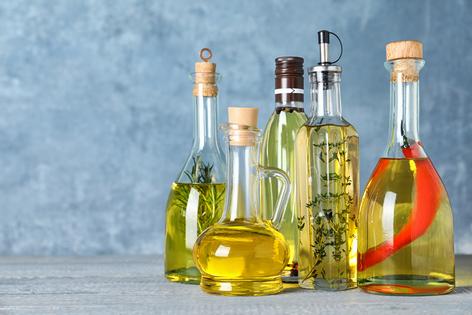Healthy oils at home and when eating out
Published in Health & Fitness
Some people may be cautious when it comes to using oils in cooking or with their food. Eating fat with meals conjures thoughts of high cholesterol and, well, getting fat. The fact that some fats are labeled as “bad” adds to the confusion and misconception that all fats are unhealthy.
But that isn’t the case.
“It’s important to consume oils,” says Shilpa Bhupathiraju, assistant professor of medicine at Harvard Medical School and assistant professor of nutrition at Harvard's T.H. Chan School of Public Health.
Oils and fats contain essential fatty acids — omega 3s and 6s, in particular — that are part of the structure of every single cell in the body, says Walter Willett, professor of epidemiology and nutrition at the Harvard T.H. Chan School of Public Health. They’re the building blocks of hormones, help decrease inflammation, and lower bad cholesterol and blood pressure. Oil also provides taste and satiety.
The key is knowing the right kind to use. It’s easier when you’re cooking at home, a little trickier when you’re eating out and you can’t control every step in the process. But it’s not just about picking the healthiest oils. They play a part in a healthy diet when they’re part of an eating plan that minimizes processed foods, simple carbohydrates, and sugar.
Healthy and not-so-healthy oils
In general, Willett says that the healthiest oils are liquid and plant-based. The one that comes to mind first is olive oil, and for good reason. “It’s stood the test of time,” he says. It helps lower blood cholesterol and provides antioxidants, and extra virgin is the ideal version, as it’s the first pressing and least refined.
After that, corn, canola, sunflower, safflower, and soybean all fall into the healthy column. The last one wasn’t always considered a healthy choice because it used to be hydrogenated, but now it’s in a natural state and a good source, says Willett.
On the unhealthy side, there’s lard, butter, palm oil, and coconut oil. The commonality is that they come in a semi-solid state and have a high level of saturated fat. The consumption of that fat increases LDL cholesterol (the bad kind), and has been associated with increased risk for cardiovascular disease and diabetes.
Willett says part of the challenge is cultural. Northern European tradition is based on eating animals and animal fats, and those fats, like butter and lard, come in solid form. The Southern European approach, like the Mediterranean diet, is based on plant-based oils, particularly olive.
While saturated fats provide none of the above-mentioned health benefits, they don’t have to be avoided entirely, just minimized to 5% of your diet, says Willett. For example, if you typically consume 2,000 calories a day, only 100 should come from saturated fats.
Eating out versus at home
If you’re eating at home and you’re using healthy oils, there is less concern about consuming the wrong fats or too much. Whether you’re frying, sautéing, or dressing a salad, you’re in control of all the factors. Using too much oil isn’t such a concern, Bhupathiraju says, since people usually regulate their intake through knowing when something will taste too oily.
Frying, in general, is often a worry, but it’s not necessarily unhealthy. It’s more about what’s being fried. Cheese, a saturated fat, wouldn’t be a great choice, but zucchini wouldn’t be bad, as Bhupathiraju says.
The concern with fried foods, and eating out in general, is what kind of oil is being used and how. With deep fryers, if the oil isn’t regularly changed, it repeatedly gets reheated and trans fats are created. These can produce inflammation in the body, which can lead to heart disease and Type 2 diabetes, and contributes to the breakdown of cell membranes.
The easiest move is to avoid eating all fried foods. But Willett says that, again, that’s not always necessary. The use of trans fats was prohibited in 2018, so it’s likely a restaurant is using a healthier oil. Even so, eating fried foods occasionally isn’t too harmful.
Focus on maintaining a healthy diet, with good oils
Willett says that people get the majority of their calories from two sources — fats and carbohydrates — and “what’s important is both should be healthy,” he says.
When you eat healthy carbs and fats, you don’t have to worry about how much of either you’re eating. “The ratio doesn’t make much difference. They’re both healthy,” he says. The focus is on overall eating. A healthy diet can consist of mostly whole grains like brown rice, steel-cut oats, wheat berries, and quinoa. The less something is milled and made into a powder, the more slowly it will release into the body, preventing sudden spikes in blood sugar.
While low-fat diets had some popularity in the 1990s, low-fat products aren’t healthier. Willett says that research has shown that low-carb diets are more effective for weight loss than low-fat ones, and that low-fat diets are not more effective for weight loss than higher-fat ones.
The best approach to eating well is the science-backed recommendation of having lots of colors on your plate. Orange, yellow, green, and red foods supply various antioxidants and phytochemicals that may be protective to the body. When you compose your diet like this, chances are you'll eat more slowly and consume fewer empty calories, Bhupathiraju says.
“Enjoy fats,” Willett says. “Good olive oil is good for you. It will help you enjoy the salad and make the eating experience and eating of vegetables more enjoyable.”
(Steve Calechman is a contributor to Harvard Health Publications.)
©2022 Harvard University. For terms of use, please see https://www.health.harvard.edu/terms-of-use. Distributed by Tribune Content Agency, LLC.










Comments